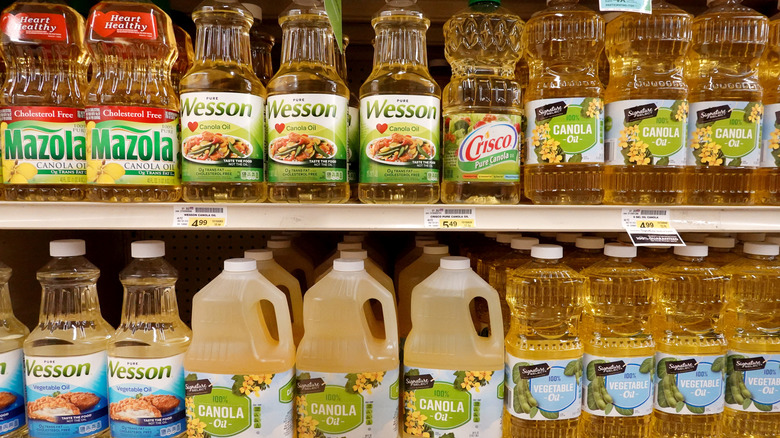You Should Think Twice Before Buying Cooking Oil In Bulk
Getting staples like cooking oil in bulk seems like a pretty practical decision at first. Heading over to Costco and buying a bunch of cereal or steaks to freeze has the advantage of saving both time and money. You already know you are going to use these items all the time, and it stinks to have your cooking stopped short by the sudden realization you're missing a key ingredient. Shopping can be fun, but sometimes it's just a chore. So why not cut a big part of the hassle out of the equation and save a few bucks in the process?
The downside of buying in bulk is the propensity for food waste. When we trade freshness for convenience, we might save a few dollars upfront, but unless you're someone with rigid eating habits, it can be impossible to predict the grocery items you'll need a month from now, let alone a year. According to the USDA, roughly 133 billion pounds of food are wasted annually, and a lot of that is unused food going bad on your shelf. Real Simple notes that one of the ways to avoid food waste is going to the grocery store more often and with a smaller list. But that should be less of a problem for items like oil that take a long time to go bad, right?
Cooking oil can go rancid before you use it
You might keep oil in your pantry, bulk purchased or not, with the assumption that it will stay good for years, but that isn't the case. According to Best Life, bulk purchased oil is a bad idea because it can easily go bad before you get the chance to use it, and rancid oil is not something you want to be dealing with. Cooking oils degrade far quicker than many people realize. The USDA recommends storing sealed cooking oil for no more than 12 months, and possibly as little as six. If you are only using one oil like olive oil, and using it all the time, you might be able to go through all your bottles by then, but your average cook probably isn't using enough of one oil each month to justify purchasing it in bulk.
Not only does cooking oil go bad more quickly than you might think, but the "best by," date you might use to judge its freshness can also be misleading. As Nutrition Facts reports those dates can be off by a large amount of time, with some types of oil going bad six months or more before manufacturers said they would. That isn't even taking into account that you don't know how long oil has sat on the shelf before you bought it. So be careful with your cooking oil, and save those bulk purchases for flour and alcohol.

